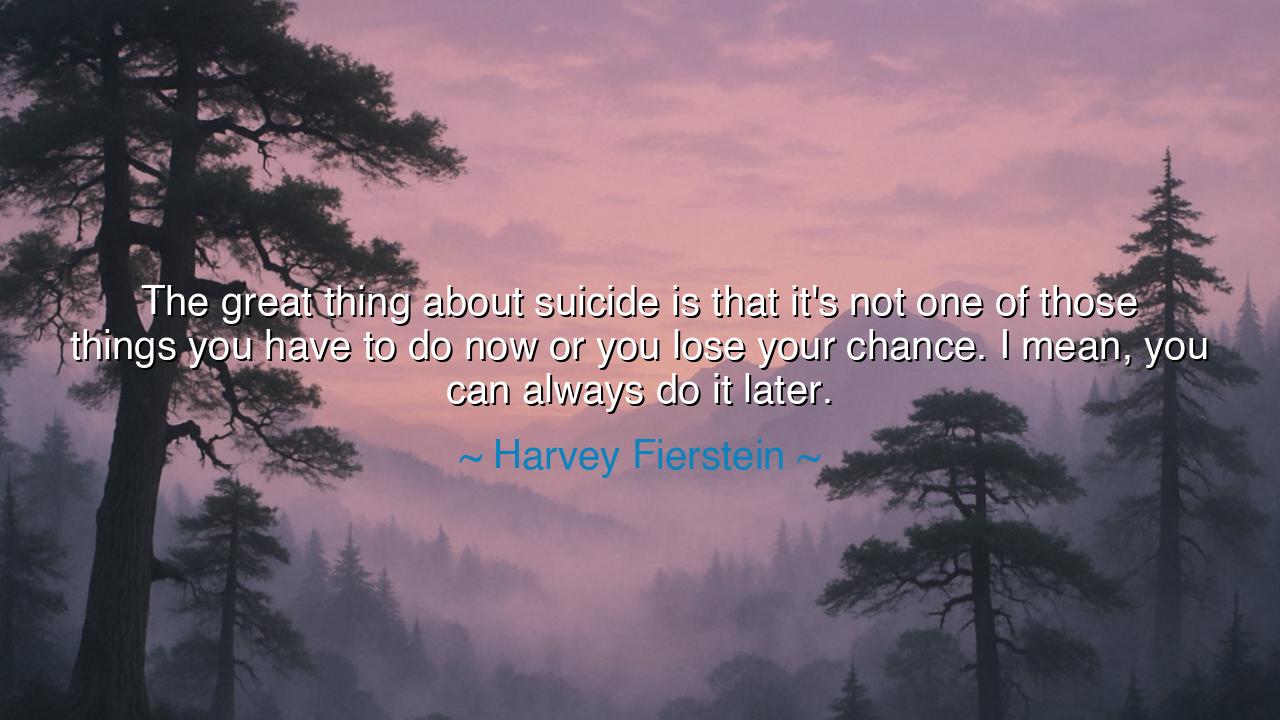
The great thing about suicide is that it's not one of those
The great thing about suicide is that it's not one of those things you have to do now or you lose your chance. I mean, you can always do it later.






In the quiet shadows of human existence, where pain and suffering often go unspoken, there lies a delicate balance between life and death. In his provocative statement, Harvey Fierstein touches on this precarious line when he says, “The great thing about suicide is that it's not one of those things you have to do now or you lose your chance. I mean, you can always do it later.” These words, though blunt, invite us to face the harsh reality that many people live with every day—the sense of hopelessness that suffocates the soul, the feeling that escape is the only way to end the pain. Yet, Fierstein’s seemingly dark reflection holds a deeper, more important lesson: life, though fraught with suffering, is always worth continuing, for the future always holds the possibility of change and healing.
In the ancient world, the question of life and death was explored deeply by philosophers, poets, and sages. The Greeks had a profound relationship with fate, and the concept of suicide was often seen as a tragic departure from the trials and lessons that life had to offer. Socrates, when sentenced to death, chose to face his fate with dignity rather than take his own life, believing that death was not to be feared, but embraced as a natural part of existence. Yet, his choice also reflected the idea that to take one’s life prematurely is to cut oneself off from the possibility of further growth, learning, and wisdom. Fierstein’s words echo this wisdom in a stark way: suicide is always an option, but by choosing it, we may miss the very possibility that life offers—a chance for change, for healing, and for rediscovery.
Fierstein’s comment also speaks to the nature of time—how life can often feel like a relentless struggle, a never-ending battle against forces beyond our control. In these moments of despair, it may seem that death offers peace, an end to suffering. But just as Socrates held that death is a part of the cycle of life, Fierstein suggests that suicide, though always available, is not an act of finality in the way we often think. It is, in his view, not a decision that must be rushed, but one that can be postponed, and in this delay, we are reminded that life itself can still surprise us with moments of redemption, of renewal, of light after the darkest hours.
The ancients also understood that the mind and soul are intricately tied to the body. When we are caught in mental anguish, when the spirit is wounded, it is easy to feel that pain is endless and that there is no way out. Yet, just as the stoic philosophers believed in the power of endurance, in facing life's struggles with resilience, they also understood that no suffering is truly permanent. Marcus Aurelius, in his meditations, wrote that “The impediment to action advances action. What stands in the way becomes the way.” This lesson of the stoics reminds us that the struggles we face, no matter how overwhelming, are not the end of our journey. Fierstein’s dark humor is not a suggestion to take life lightly, but an invitation to embrace the possibility that change is always within reach.
The story of Job, from the Hebrew Bible, illustrates this deeply. Job, a man who lost everything—his wealth, his health, and his family—found himself in a state of such despair that he cried out to the heavens, asking, “Why was I born?” Yet, despite his immense suffering, Job’s story does not end in death but in the restoration of all he had lost. Through his journey of suffering and faith, Job’s story reminds us that even in the deepest moments of despair, there is hope—a chance for renewal, for a better tomorrow, if we simply allow ourselves the time to endure and wait for the storm to pass. Job's resilience is the antithesis of Fierstein’s reflection—though the pain may feel unbearable, the future always holds the possibility of a turnaround.
In our own lives, the lesson is clear: we must embrace the gift of time, and the uncertainty it brings. Fierstein’s words, though dark, remind us that suicide is always an option, but it is never the only option. The chance to change and to experience the unexpected beauty of life lies just beyond the horizon of despair. It is in our darkest moments that we must remember that nothing in life is permanent—not the pain, not the suffering, and not even the feelings of hopelessness. The road may be long, and the night may seem endless, but just as the ancients knew, we are not meant to journey alone or to take drastic steps out of despair. Instead, we must endure, knowing that life—with all its struggles—holds the potential for redemption.
Thus, let us take this lesson to heart: when we find ourselves in the depths of despair, when the temptation to give in to destruction seems overwhelming, we must remember that time is on our side. The choice to end it all is always available, but it is not the final answer. Healing, growth, and rediscovery often lie just beyond the pain we are currently experiencing. In embracing life—its challenges, its uncertainties, and its surprises—we open ourselves to the possibility of transformation, to a future that is brighter, even in our darkest hours. Let us choose life, even when it seems impossible, and know that the journey, though difficult, will lead us to places of peace, joy, and fulfillment.






AAdministratorAdministrator
Welcome, honored guests. Please leave a comment, we will respond soon